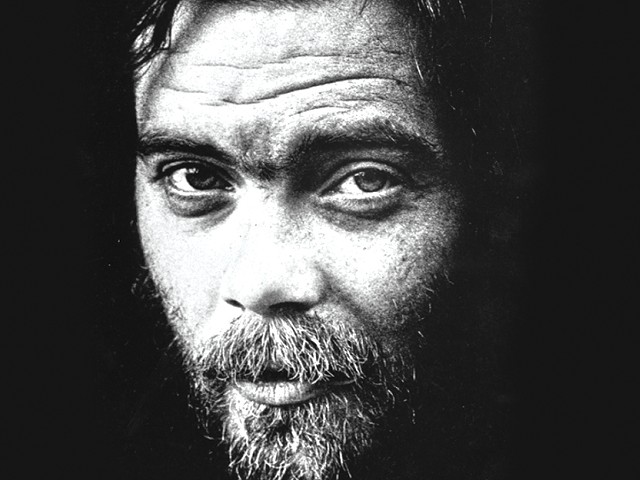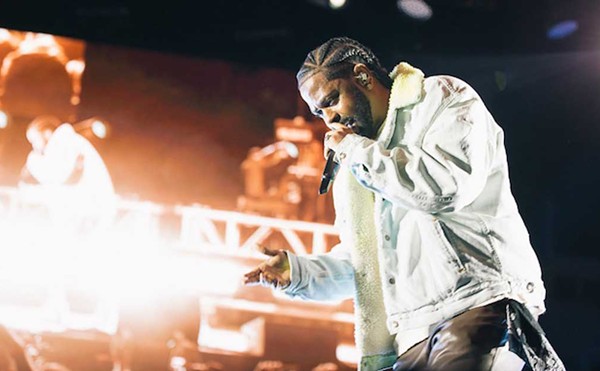In the monstrous belly of the Hollywood beast, Lee Spielman and his bandmates have created a haven for the spirit of independence and community that their home in the Bay Area is so famous for. Their skate shop, music venue, and art gallery, Babylon, is located two blocks north of Sunset Boulevard, not far from the old epicenter of LA punk, the Whisky a Go Go. Venues like the Whisky seem a little tired these days, but when I asked John Doe of the seminal LA punk band X — once a regular fixture at the Whisky — for evidence that punk rock was still relevant, he had an answer for me immediately.
"I went to this event in LA with a band called Trash Talk, and they were completely inciting the audience. In six songs there were maybe 150 stage divers," he says. "It was insane."
When I call Lee Spielman, the band's lead singer and creator of their inverted peace sign logo, he is at Babylon. About 15 minutes into our conversation, he asks me to hold on. Someone has shown up asking to tag one of the walls. "I mean, you'd be surprised," he says. "We get everyone who's like, 'Yo, let me do a fucking pop-up shop.'"
Spielman grew up attending shows at the 924 Gilman club in Berkeley, famous for its inclusiveness and cooperative system of management, as well as being the epicenter for the ska and pop-punk renaissance of the mid-'90s. It was the center of national attention, and the energy and enthusiasm that typified the Bay Area scene and drew in young people from all over Northern California.
"Sacramento is the capital of California, but I wouldn't say it's 100 percent a destination spot for bands on tour," he says. "When bigger bands would come through on tour and shit that I would want to see, they would always stop at Gilman. So that's kind of the first place that I started going to shows.
"I think Gilman is the first place that I kind of started taking my love for punk and hardcore, and being involved a little bit more serious. That was the first place that I started traveling and going to shows and meeting people outside my city that were into the same things as me. I made a lot of friends through going there, and kind of learned a lot through going there too."
Many remember 1977 as the year punk rock broke into the mainstream consciousness. But in full view of the immense, global DIY movement that emerged in its wake, it is interesting to note another watershed cultural moment that took place that year. In cities like Milan, Bologna, and Rome, '77 was also the year that radical students and the counterculture broke with the establishment Left. The Italian Communist Party, then the largest political party in Europe by membership, had failed to live up to its promises after gaining power in the legislature. Maybe the global revolution was never coming. Maybe it was time to start building utopia right here, right now.
The Autonomia movement of '77 mainly sought to do this via "autoreduction," an academic term for tactics like mass shoplifting, calling in sick to work, fare dodging on public transit, and sneaking into the movies. But they also built an immense network of so-called autonomous spaces, where the ideas associated with punk and hardcore were able to thrive. If you are a small punk band touring through Europe today, these are probably the same places you perform, and maybe even where you lay your head at night, when the show is over. It is the same model Spielman was first exposed to through hardcore, and his early days at Gilman, and he seems to have constructed Babylon with a similar reverence for the principles of inclusivity and anti-commercialism.
"I've never been to Warped Tour in my life," Spielman says. "That shit was too expensive, and I didn't really like that type of music. I grew up on more like, an aggressive side of things. I always thought that side of shit was a little bit weak. So it wasn't really for me, you know what I mean? Why would I go pay $100 to go see a bunch of shit, when I could pay less than 10 bucks to see a bunch of sick bands that I actually like, in a venue that I feel comfortable in?
"With Babylon, we kind of tried to play off that idea, and build a place where kids could come be creative and meet other people that they like. Other people that they may not meet at school, or whatever, just people that they have stuff in common with — '60s-style peace and compassion."
It has also been an incubator for radicalism and subversive ideologies, and the band seem to have brought this San Francisco tradition on tour with them as well. Performing for the Zumiez skateboarding championships at the Michigan Theater in August 2014, Trash Talk bassist Spencer Pollard downed a photographer's aerial drone by repeatedly throwing beer cans from the stage, sending it crashing on to the dance floor. Spielman, however, seems unfazed by the episode and subsequent fallout. "Crazier shit has happened to us on stage than a fucking drone flying over us," he says.
Trash Talk have played, and even lived, all over the globe, from the Pacific Northwest to the U.K., using the latter as a base for their European operations. The strategy was to become a fixture on local bills, or as Spielman says, "Go to a region, take over, fuck it up, smash it, and then on to the next place." But when I ask him if he has a regional preference when it comes to punk and hip-hop, he doesn't try to hide his loyalties.
"I feel like West Coast music has a West Coast feel," he says. "I'm not from the East Coast so I can't really speak on that. But it's like, you listen to a band like Black Flag, Circle Jerks, or some shit, it feels like you're at a skate park like launching off a ramp, or you're at the beach surfing or some shit. You listen to fucking Snoop Dog or Dr. Dre or some shit it feels like you're in your whip like riding down the street, through LA with palm trees. It's almost like a soundtrack to what actually happens.
"I hope that we can get to a point with our music and our band to where we just have a place in history. Not that was like a band that was just a band. Music is great, I love making music and playing music, but it's more than that. It's a vibe. It's an aesthetic. So hopefully we can implant that on the world the way bands like that did."
Trash Talk performs on Thursday, Oct. 27 at the Marble Bar, 1501 Holden St., Detroit; ticketfly.com; $15.





